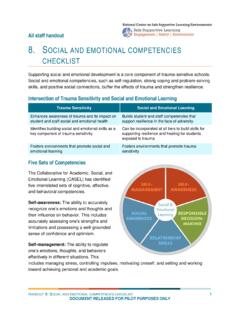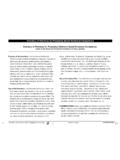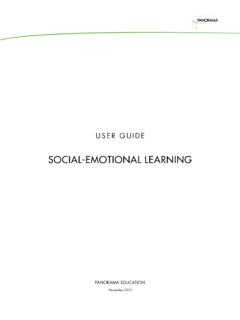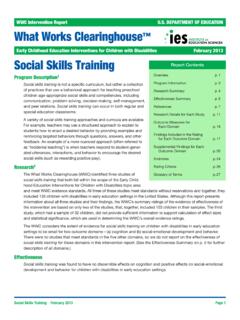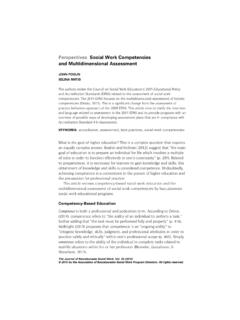Transcription of The Role of Parental Involvement and Social/ Emotional ...
1 29 School Community Journal, 2018, Vol. 28, No. 2 Available at The Role of Parental Involvement and social / Emotional Skills in Academic Achievement: Global PerspectivesMamta Roy and Regina Giraldo-Garc aAbstractThe purpose of this systematic literature review is to examine global per-spectives on the role of Parental Involvement and social / Emotional skills in school-age children s academic success. A multistage filtering analysis process provides relevant information in relation to key issues on the topic of paren-tal Involvement in different countries and reveals distinctive characteristics of Parental Involvement as well as contextual differences from one culture to an-other. A discussion of the concepts is presented, and recommendations are drawn from the Words: Parental Involvement , education, social and Emotional skills, aca-demic achievement, global perspectives, culturesIntroductionToday s world is technologically driven, and each nation must compete with every other in terms of economic and technological development in the global information-based economy.
2 To align with international standards of educa-tion and work (Partnership for 21st Century Skills, 2007) and prepare the youth of a nation to compete in a global economy, parents must invest and en-courage not only the pursuit of academic excellence but also the development of a wholesome personality. Both parents and the school community need to SCHOOL COMMUNITY JOURNAL30make a conscious and intentional effort to facilitate the development of aca-demic and social / Emotional skills in children. The purpose of this review is to examine relevant literature on Parental Involvement and critically discuss glob-al perspectives on the topic in connection to the promotion of social / Emotional skills as an important asset for children s academic success and development.
3 In this review, Parental Involvement is defined as those behaviors shown by the parents, both in home and school settings, meant to support the develop-ment of their children s social / Emotional skills and facilitate their educational success (El Nokali, Bachman, & Votruba-Drzal, 2010; Goleman, 1998). Socio- Emotional intelligence has been discussed as comprising skills that facilitate the processing of social and Emotional information and improve problem-solving and leadership-context activities in which the child must interact with other people and consequently deal with varied emotions in social situations (Gole-man, 1998). Likewise, we discuss the importance of parents as support systems for children s social and Emotional learning, understood as a process through which children gain and apply the knowledge, attitudes, and abilities that will help them understand and manage emotions, set goals, embrace empathy for others, and make responsible decisions (Taylor et al.)
4 , 2017; Redding, 2014).The authors emphasize the responsibility of parents to support their chil-dren, both in terms of academic achievement and social / Emotional skills, in order to have a real impact on their development as individuals prepared to in-teract with society on a global scale. It is the belief of the present authors that parent-supported development of social / Emotional skills should be encouraged in their children s lives in order for them to achieve to the highest standards, both in school and in all other aspects of their lives. MethodologyThe review of the literature indicates that Parental Involvement differs be-tween cultures. Further, it discusses the link between Parental Involvement and the promotion of social / Emotional learning and skills in school-age children.
5 A multistage filtering process allowed the selection of sources that support the conceptual, cultural, and academic contexts of the topic. More specifically, the methodology of the review consisted of a systematic search of databases, includ-ing ERIC, Google Scholar, EBSCO host, and other education-related online sites as well as the adoption of a predetermined set of inclusion and exclusion criteria that prioritized peer-reviewed references. For example, the articles se-lected for the literature review were included in the analysis and discussion only if they addressed variables such as Parental Involvement , social / Emotional skills, academic achievement or outcomes, as well as articles related to the topic that described the intersection or associations between these variables.
6 Another PARENTS & social / Emotional SKILLS31inclusion criterion had to do with the contribution of the articles regarding different perspectives of Parental Involvement and social / Emotional skills in more than one cultural context ( , Western and Eastern views of Parental Involvement and achievement). Conversely, articles that did not meet the cri-teria for inclusion or addressed Parental Involvement outside the parameter of the population of interest school-age students were excluded from the final analysis and discussion in this literature review. The review process provided relevant information from a sampling of different cultural perspectives which is presented and then discussed in relation to key issues of Parental Involvement across different of PerspectivesIn the last decade, there has been an increased interest in the role of emo-tional skills in the academic success of students as well as in their Emotional adjustment in and beyond the school environment.
7 The promotion of social / Emotional skills to enhance students academic performance finds an ally in the level and style of Parental Involvement if we consider that effective, lasting academic learning and socio- Emotional learning are built on caring relation-ships (Elias, 2006, p. 7). In seminal work in the field, Goleman (1998) noted that the processing of social and Emotional information, as well as the ability to problem-solve and engage in leadership activities that demand interpersonal interactions, are facilitated by what he termed an individual s socio- Emotional intelligence. Some of the competencies and skills observed in the theory of socio- Emotional intelligence include: (a) self-awareness; (b) self-regulation; (c) social skill; (d) empathy; and (e) motivation (Goleman, 1998).
8 A person equipped with such social / Emotional skills is able to handle with confidence the varied challenges he or she on socio- Emotional intelligence indicates that there is a relation-ship between such intelligence and academic achievement and that Emotional intelligence is highly related to more prosocial behaviors and fewer antisocial behaviors in elementary school children (Mavroveli & S nchez Ruiz, 2011). Although there are multiple angles to the effect of Parental Involvement on children s academic achievement, this article reviews existing literature on the topic, including the effects of family socioeconomic status (SES), cultural background, and indicators of children s social / Emotional skills, among other characteristics that may contribute to a child s academic success.
9 In addition, the authors discuss the implications of Parental Involvement in children s de-velopment of social / Emotional skills to facilitate their academic achievement as well as life experiences. SCHOOL COMMUNITY JOURNAL32 Most of the literature discusses the concept of socio- Emotional intelligence. However, some more recent studies shift toward a definition that focuses on the concept as social / Emotional learning instead of intelligence, and these stud-ies emphasize the learning process and skill sets a child gains in a social and Emotional context which will, as stated below, become essential skills for living (Goleman, 2006). Goleman s proposed social / Emotional skills include listen-ing and talking as tools an individual can use for solving and/or negotiating problems, resulting in positive outcomes for the participants in each situation.
10 The literature also explains that an individual with social / Emotional skills con-sequently develops social / Emotional competency, a sense of self-worth, regard for others, and Emotional understanding and management to set positive goals and make responsible decisions (Redding, 2014, p. 6). Parental InvolvementDefining Parental Involvement is not so easy a task, as it encompasses mul-tiple behaviors. In this review, Parental Involvement is seen as those behaviors shown by the parents, including the home and school environments, that are intended to support not only their children s educational progress but also their social / Emotional skills (El Nokali et al., 2010; Goleman, 1998). Ongo-ing research on Parental Involvement has often been drawn from the model by Epstein (2010) and describes teacher parent relationships as based on com-munication and cooperation and Parental Involvement as malleable depending on the practices of teachers, administrators, other parents, and students.










